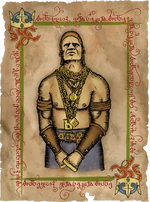| Shit and cabbage always go hand in hand, one drives the other. Its perpetuum mobile. | |||
| - Schuttenbach's wisdom, pg. 153 Baptism of Fire (U.K. edition) | |||
Percival Schuttenbach was an excellent metallurgist, technician, and jeweler from Mahakam. Before opening a flourishing jewelry workshop in Novigrad, Percival spent time with Zoltan Chivay's company and was in fact its only non-dwarven member.[1]
Biography[]
On the top of Montsalvat, Percival once found a large goblet carved from a single piece of milk opal with a golden base and rim set in jasper, the goblet of legends. But as he had no need for such a cup at the time and needed to deliver a transport of diamonds and rubies, meant to be used for drill bits and files, he exchanged it for a mule.[1]
He met Barnabas Beckenbauer at one point in time and the two became friends.[2]
In Zoltan's company[]
Eventually, Percival joined Zoltan and his band of dwarves for protection after the breakout of the Second Northern War in July 1267, eventually becoming good friends with them. The group soon after waylaid and robbed a rich hawker who tried to flee Dillingen after the townsfolk exposed his trade with the Scoia'tael. The merchant defended his property like a lion, shouting for aid several times before the dwarves attacked him with batons. Intending to fund future enterprises of each individual with the treasure, the group helped load the trunks on a wagon and set off into the forest.
Early the following month, Schuttenbach and the rest of the group had been escorting Kernow refugees, specifically mothers and children, to safety. They met Geralt of Rivia and the witcher's own group for the first time on the way toward the Yaruga river from Brokilon. Chivay advised the witcher to join up with dwarves on their way eastward to refuge, which was accepted. Later on, Schuttenbach sensed porridge with his infallible gnomish nose and stated people had to live nearby. Chivay decided he, Schuttenbach, and Geralt's companions would investigate, while Munro Bruys and Figgis Merluzzo awaited for a signal in a form of a sparrowhawk call.
After crossing into Brugge, the group stopped at the river O. Convinced not to carry the treasure any longer, Zoltan ordered Merluzzo, Bruys, Yazon Varda, and Caleb Stratton to hide it; the rest continued to Fen Carn. Much later, during an unexpected battle between the refugee-killing Nilfgaardians and the Temerian Army, Chivay's company reunited. They evaded death by running to the woods, but Stratton was hit by the 7th Daerlanian Cavalry Brigade. After burying Stratton and mourning his passing, the dwarves continued. They met Geralt and his company once more, in Angren, and at long last the company decided to return home to Mount Carbon.[1]
Successful jeweler[]

Schuttenbach Jewelers advertisement in Vizima
During the Battle of Brenna in March the following year, Percival avoided conscription by invoking the ancient rules of gnomish religion, despite it being widely known that he would sell the entire pantheon for a pickled herring and not bat an eye. Following the end of the war, he opened a jewellery store in Novigrad, where he used the parrot Field Marshal Duda that he'd bought from Zoltan earlier as a living advertisement, teaching him to shout "Brrrilliants, brrilliants". Soon enough, he had a galore of customers and full cashbox.[3]
With business booming, Schuttenbach opened a branch in Vizima, with the tagline "Where every ring is that special ring".[4] Unfortunately for the gnome, a racist incident happened to him in 1271 which convinced him to pack up and leave Novigrad and move his main shop to Mount Carbon, Mahakam's capital.[5]
Appearance and personality[]
While not as strong as his dwarven mates, he was much more agile and perceptive. It made him an ideal scout who could also smell food from a far greater distance than others, thanks to the typical gnomish nose.[1]
Trivia[]
- Band Percival named themselves after him and, later on, worked on The Witcher 3: Wild Hunt soundtrack.
Notes[]
- In the non-canon short story Something Ends, Something Begins, Schuttenbach attended Geralt and Yennefer's wedding.
